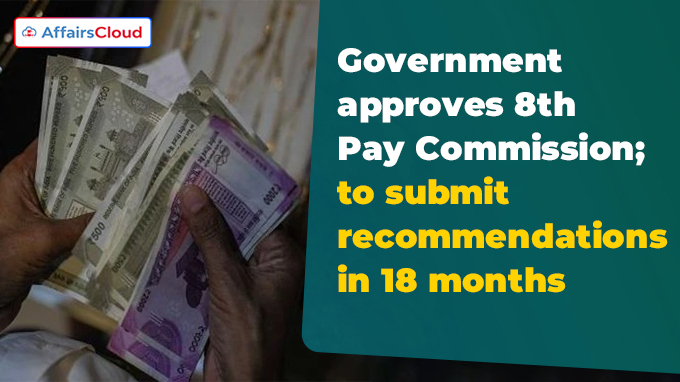In October 2025, the Union Cabinet chaired by Prime Minister (PM) Narendra Modi approved the Terms of Reference (ToR) for the 8th Central Pay Commission (CPC), a temporary body which will review the salaries of nearly 50 lakh central government employees, including defence services personnel and about 69 lakh pensioners.
- The commission has been directed to submit its recommendations within 18 months of its formation and may submit interim reports when specific recommendations are finalized.
- The recommendations of 8th CPC are expected to be effective from January 01, 2026.
Exam Hints:
- What? Approval of ToR for 8th CPC
- Approved by: Union Cabinet chaired by PM Narendra Modi
- Purpose: To review and recommend changes to pay structure of central employees
- Chairperson: Former SC Justice Ranjana Prakash Desai
- Other Members: Professor Pulak Ghosh (as the part-time member); Pankaj Jain (Member-Secretary)
- Submission of Recommendations: 18 months of its formation
About 8th Central Pay Commission (CPC):
Approval : In January 2025, the Union Cabinet had approved the formation of 8th CPC to review and recommend revisions regarding the salaries and benefits of central government employees.
Composition: The 8th CPC will include 3 members including, chairperson, one part-time member and one member-secretary.
- The Union Cabinet has also approved the appointment of former Supreme Court (SC) Justice Ranjana Prakash Desai as the chairperson of the pay commission.
- Also, Professor Pulak Ghosh, who is currently working as Professor at Indian Institute of Management (IIM) Bangalore (Karnataka), has been named as the part-time member.
- And, Pankaj Jain, Secretary of Ministry of Petroleum and Natural Gas (MoPNG), has been named as the member-secretary.
ToR: The Union Cabinet has laid out certain ToR for the commission while recommending the pay structure of central government employees:
- The economic conditions in the country and the need for fiscal prudence;
- Ensuring adequate resources are available for developmental expenditure and welfare measures;
- The unfunded cost of non-contributory pension schemes;
- Projecting impact of the recommendations on the finances of the state governments which usually adopt the recommendations with some modifications;
- The existing emolument structure, benefits and working conditions available to employees of Central Public Sector Undertakings (PSUs) and private sector.
About Central Pay Commission (CPC):
Periodic Formation: CPC are usually formed once every 10 years to advise government on revising the pay structure and scale for its employees.
- Since India’s Independence, a total of 7 PCs have been constituted.
1st PC: The Government of India (GoI) formed the 1st PC in January 1946 under the chairmanship of Srinivasa Varadachariar. The commission which submitted its report in May 1947 introduced the concept of ‘living wages’.
Previous PC: The 7th PC was constituted by the United Progressive Alliance (UPA) government in February 2014 under the chairmanship of Ashok Kumar Mathur and its recommendations came into effect on January 01, 2016.
ToR Drafting: Prepared by the Joint Consultative Machinery (JCM) and approved by the Cabinet Committee under the Ministry of Finance(MoF), the JCM comprises representatives from various ministries.





